Oculus Rift S VR PC-Powered Gaming Headset
Introducing the most advanced PC-powered gaming headset for a truly immersive VR experience. Oculus Rift S designed with Lenovo puts you at the center of virtual reality’s most pulse-pounding, PC-powered gameplay. See the action unfold all around you through our sharpest lenses and next-generation optics. Lose yourself in the experience with a comfortable, improved design that lets you take your VR to the next level with the Oculus Rift S.
- Top VR gaming library: Blast, slash and soar your way through the top library in VR gaming. Oculus Rift S lets you play hundreds of games and exclusives already available in the Oculus store, with so much more to come.
- Improved optics: Stare down the competition with next-generation lenses and a sharper display. Improved optics deliver bright, vivid colors and reduced “screen-door” effect.
- Ergonomic design: keep your head in the game thanks to a Halo headband redesigned with speed in mind. Rift S stays securely and comfortably in place with a quick twist of the Fit wheel, so it can take-or double take-your fastest reactions.
- Oculus touch controllers: arm yourself with our updated Oculus touch controllers. Your slashes, throws and grab appear in VR with intuitive, realistic Precision, transporting your hands and gestures right into the game.
- Oculus insight tracking: take a step forward with Oculus insight. It translates your movements into VR No matter which way you’re facing and provides room-scale tracking without external Sensors.
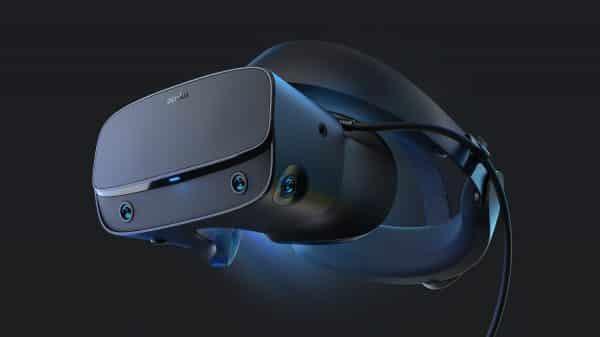












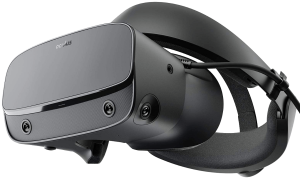



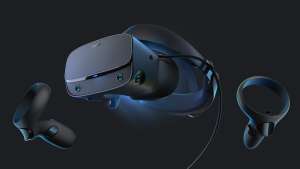
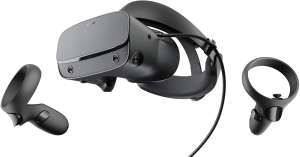
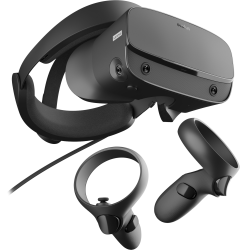
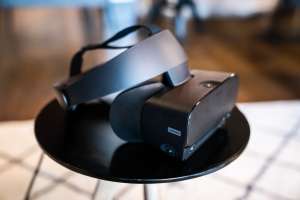
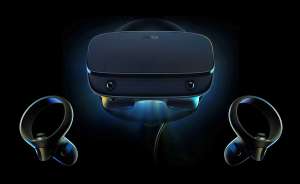
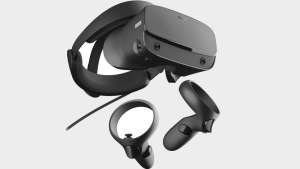
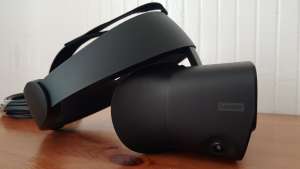
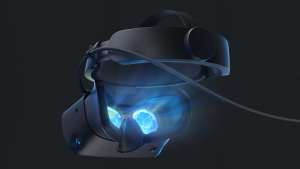
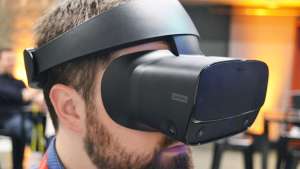
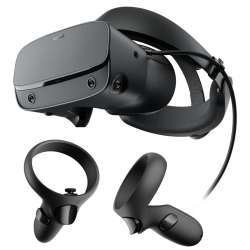
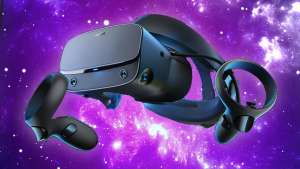
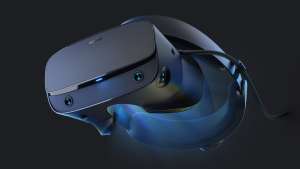
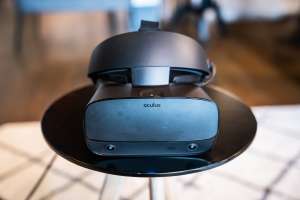
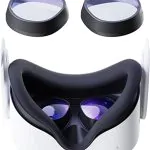
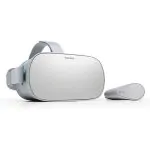
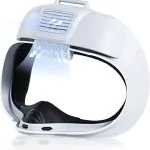
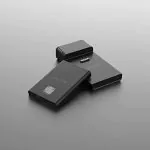
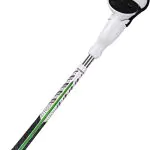
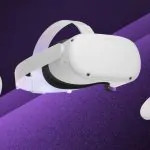
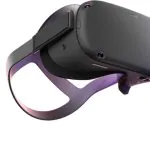
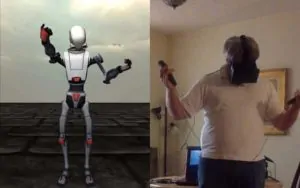


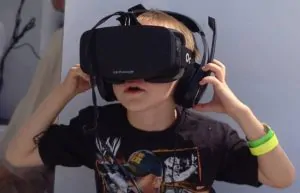
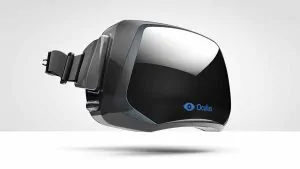
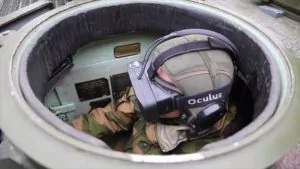






Microdev –
* Edited 2019-Jun-02 – marked by ** – **I’ve used Oculus headsets since the first beta before Facebook owned it. This headset promises to be the first step in making VR accessible to the PC masses. It uses a single connection, no external sensors, and is plug and play (in theory).The graphics are a slight step up from the last iteration, noticeable, but not massive. The controllers are likewise a slight step up from the previous generation and very easy to adapt to.The new see through cameras and guardian system works very well. If you are new to Oculus, this is a visual barrier to let you know when you are going to run into things in the ‘real world’. With the headset on, you see a camera view of the real world. You trace out your play area with a ‘laser’ and this defines your play space, surrounded by virtual walls. The setup is easy and intuitive.Responsiveness is great and much better than single or dual sensor tracking of old. There is no break in the motion when a sensor loses sight of the headset because this headset tracks from the inside out using cameras placed all around the headset.Also gone is the glare from the lenses. Bright scenes had no glare around the edges (halo) like the last set. Colors were good and vibrant. **In dark scenes the LCD panel shows its weakness with washed out blacks (more like grey than black). In dark scenes it is very hard to distinguish items due to a lack of contrast. When playing Arizona Sunshine as a test, I knew the area and still couldn’t see things in the dark with a flashlight. Unlike the last panel, this severe lack of contrast and black level is a strong drawback from OLED panels for space sims (Elite Dangerous, etc.) or shooters i where there will be a lot of dark areas.**** The lenses don’t steam up as fast as the old units although I do notice that my face is much more ‘sealed’ to the front of the unit. This is good and bad (for me). It is good in that it seals out light almost entirely. However, I used to cheat and look through the gaps by my nose to see the keyboard, etc., in the past. Now I have to physically lift the unit to find the keyboard, etc. It should be noted that I use my Oculus more for seated gaming (Elite, Project Cars, Assetto Corsa, etc.) than standing games. When playing standing games with the touch controllers the better seal would be preferred. If you want to peek into the ‘real world’ you can double tap the Oculus button on the touch controller to enable the cameras. This works well, and is thoughtful, for situations when you are spinning around shooting zombies and become entangled in your headset cord. **** The built in sound is very weak with no bass. A canon shot sounds like a ‘tink’ rather than a ‘boom’ in War Thunder for example. The headset uses directional sound from the strap to direct sound down towards your ears. Unlike the last version, headphones will not fit over the straps on this version. While it does include a built in microphone, I prefer using a noise canceling headset for gaming that also provides a richer sound (for seated play). This design simply does not allow for that. The sponge on the strap sides (used for comfort) create a 3/4-1″ (20-25 mm) offset, on each side, that hold the headphone arms (and ear pads) away from your head. This applies to over the ear, or on ear headphones. If you use ear buds it won’t be a problem.**Speaking of the strap, it works surprisingly well with a single wheel to tighten the unit to your head. It pulls the headset to your face and there is a release to move the actual lens part (the big box) away from your face. If you wear glasses, this is far better than the last set. It is a little harder to get the up-down into focus because the ‘box’ does not pivot in any way. All in all, it’s a mix of good and bad over the old unit. Definitely easier to put on, although it goes back to full tight every time it’s removed, but harder to get into the sweet spot for focus. Once in focus, it stays put very well** Note – I raised the rating by 2 stars after getting a replacement and further testing. **So why one star? Because it doesn’t work. Upon first plugging it in, you will have to update the BIOS on everything (headset and controllers). Then you go through the VR setup. First problem was a black screen when instructed to continue the setup in VR. I unplugged it from one display port and plugged it into another and it started working. I finished setup and jumped into a game. After less than 5 minutes in the game, the screen goes black again. It was still on because I could see the backlight, but no picture and no sound from Oculus home. I can hear system sounds coming from the headset though. A reboot later and it’s still not working. Unplug, and re-plug into a new ports and it’s still dead as a door knob. So much for quality control. The Oculus app shows all green check boxes next to the device, as though all is good when it is definitely not.** I received a replacement from Amazon for another go at this model. The replacement also crashed during setup, but afterwards has worked so far. It appears the first one may have had a defective board that once heated, failed. I am rating this as 3 stars because the increased resolution and reduction in the ‘screen door’ effect does not overcome the issue with the lack of rich blacks and contrast. The old panel was better in that regard. Also the change to the strap, while comfortable, completely negates using superior headsets. Sound is every bit as important to immersion as the visual elements. In this regard, the sound in this headset is a big leap backwards. Convenient yes, but practical no.Performance wise, I have had a chance to run it through some benchmarks. This headset operates at 80 frames per second (ideally) as opposed to 90 FPS on the last Rift. On the surface this appears to be worse, but in practice it is not noticeable and did not lead to discomfort at all. I also noticed that this headset was able to keep up at a full 80 FPS in games that previously would drop to ASW (45 FPS). ASW is the Oculus method of dynamically creating filling frames when the frame rate drops below ideal. This helps with discomfort and creates a smoother playback image even through the frame rate is less than the desired 90. This headset did not drop below 80 in most of my tests using the same settings as the previous unit that would have stayed in ASW with the same settings. Clearly the unit is better at aiding graphics cards in rendering frames quicker.**I am running a current game rig with an Intel 8700k and an NVidia 1080ti. Pretty standard fair and one that worked reliably with the old headset. For $400 and after waiting years for an update, I had hoped that the headsets are intended to last longer than 10 minutes. I feel like I’m beta testing the original again. It’s clear to me they have a number of kinks to work out. This one is going back immediately.** After spending some time reviewing the latest drivers, etc., it still seems like an early release, but one that is worthy of $399.The alternative I would consider is the new Vive Index. However, the Vive is MUCH more expensive at $1,000. Furthermore, it still requires satellites setup around the room and can suffer from interruptions as a result (it usually works well in practice). This makes it less portable and more of a pain to switch between seated play and standing play in many situations. Also the touted 144 FPS refresh rate is highly unlikely in anything but simple whack-a-mole type games (Beat Saber, etc.). You will need significant hardware (2080, etc.) to push that frame rate. The controllers on the Vive also seem better (how it is held, finder tracking, etc.), but it isn’t yet fully implemented and there are a lot of questions around play with legacy device support.For these reasons, the Oculus seems like the better consumer deal.If you will be playing mostly things like Arizona Sunshine, Beat Saber, etc., this is really a very easy headset to use, and is much easier to setup and put away too. **
Kyoshi Uriza –
As of day one I tested a bunch of things on the Rift S, and there are a lot of things I like about the Rift S and some that I don’t like.Pros so far:- Display is better looking that the original Rift. – The slight drop in refresh rate hasn’t been noticeable at all for me at least.- Out of box face pad is much more comfortable.- Inside out Tracking is great so far. (still need to mess with it more but haven’t had any issues.- Throwing items in VR feels much more normal then the original Rfit. (I’ve noticed that the old method I used of pushing items to throw doesn’t often work but a normal throwing motion seems to work great…. I tried this a lot in Super Hot.- (Update 5/24/19) Built in speakers – While not perfect for someone casually playing the built in speakers work well enough to play most games without issue. It sounds like its almost not playing anything for someone outside the headset but for the wearer it perfectly audible. Lacks good base though.Cons:- Ordered a 10ft display port extender and it seems to cause the black display issue that many are reporting. – Removed the extension cable and haven’t experienced it again yet- Halo head band is pretty thick and I feel alot of headsets will have a hard time getting around it. (I use a Man O War and it barely made it over the headset)- The weight distribution feels a bit odd but it is a new headset so it might take some adjusting to. (Not sure if this is really a con yet).- Cable length is a bit shorter than I would like for my play space.Overall I think it was worth the purchase and plan to rack up some hours with the new headset. Ordered a 6ft cable to some testing with and hopefully that will work without black screening. Updates to come! 😀
River –
The Oculus Rift uses one USB and one HDMI cable, however the Oculus Rift S uses one USB and one displayport cable. So my “Oculus ready” laptop can’t use the oculus I just spent over $400 on until I hopefully find a way I can get a third party adapter to plug into the type-C since HDMI adapters allegedly don’t work for it. If you’re thinking of getting this for your laptop, unless you have a displayport or mini-displayport, DO NOT GET THE OCULUS RIFT SUpdate: Got a displayport to USB-C because I found that could potentially work, since displayport to HDMI doesn’t. Unfortunately that didn’t help and I still am unable to use this $400 sleeping mask for anything else. I reiterate, do not buy this junk
Leonhard Lagrange –
1. Kurzfazit:Diese Rezension ist recht lang geraten, da mir das Thema VR am Herzen liegt. Daher ist das “Kurz”fazit auch etwas ausführlicher als bei meinen anderen Rezensionen.Zusammenfassend spreche ich der Rift S eine Kaufempfehlung aus, besonders für Einsteiger, die nicht beliebig viel Geld investieren wollen, aber schon über einen ausreichend starken PC verfügen. Kein anderes Headset am Markt bietet für diesen Preis eine solch ausgewogene Kombination aus guter Bildqualität, sehr solidem Tracking, Benutzerfreundlichkeit und Softwareauswahl. Daher vergebe ich auch 5 Sterne obwohl ich durchaus mehrere Kritikpunkte sehe (Details weiter unten im Review).Das heisst nicht, dass die Rift S perfekt oder für jeden geeignet ist. VR-Enthusiasten ohne Budgetbeschränkung werden wohl eher mit der HTC Vive oder der bald erscheinenden Valve Index glücklich. Für VR-Einsteiger die keinen Spiele-PC besitzen, mag die PSVR eine gute Alternative sein. Diese bietet mit niedrigeren Gesamtkosten auch ein tolles Erlebnis. (Dies war auch mein Einstieg in die VR-Welt.) Ganz kabellos kann man auch mit der Quest unterwegs sein. Die gute Nachricht ist: Es gibt eine ganze Fülle von Alternativen. Für mich persönlich ist die Rift S momentan die beste Wahl.Updates:1. Tracking funktioniert auch bei anspruchsvollen Spielen wirklich gut (z.B. Beatsaber im Expert-Modus ausgiebig getestet).2. Manche Nutzer klagen über kurzzeitiges Bildflackern, Tracking-Aussetzer etc. Bei mir war das nicht der Fall, aber in der Community wird dazu geraten, die Kabelverbindung am Headset zu überprüfen. Diese kann sich wohl beim Transport lösen.3. Ich hatte nun auch Verbindungsprobleme: Schwarzes Bild, die Oculus App zeigt fehlende Displayportverbindung an. Lösung: Rift S komplett trennen, USB an (3.0) Port anstecken, ca. 5-10s warten, bis die Oculus App die Rift wieder erkennt, dann erst das Displayport-Kabel mit der Grafikkarte verbinden. Hoffentlich kommt da bald ein Patch.Besonders gut überlegen sollten sich die Anschaffung potentielle Käufer die:- einen Pupillenabstand (IPD) von mehr als 65mm haben (siehe weiter unten).- die absolute beste Bildqualität am Markt wollen.- das absolut beste Tracking am Markt wollen.- keine Facebook-Produkte wollen (einen Facebook-Account braucht man zwar nicht, aber Oculus wurde von der Datenkrake aufgekauft).Sollte einer dieser Punkte zutreffen, ist vielleicht eine der oben genannten Alternativen die bessere Wahl.2. Bewegungserkennung – Tracking:Manch einer fragt bei VR-Lösungen zuerst nach der Bildqualität. Mir persönlich ist die Bewegungserkennung, das sogenannte Tracking, deutlich wichtiger. Das mag auch daran liegen, dass ich selbst im Forschungs-Bereich Computer Vision schon an solchen Themen gearbeitet habe. Aber auch ohne fachliches Interesse ist es für ein glaubwürdiges und angenehmes VR-Erlebnis sehr wichtig, dass sowohl die Kopfbewegungen als auch die Bewegungen der Controller akkurat wiedergegeben werden. Dies ist zum Beispiel eine der ganz großen Schwächen der PSVR, welche noch die guten alten Move Controller der PS3-Ära verwendet.Grundsätzlich gibt es zwei Möglichkeiten für Tracking: Externes Tracking verwendet eine oder mehrere Kameras, die den Nutzer von aussen filmen und die Bewegungen von Markierungen auf dem Headset oder den Controllern nachverfolgen. Das kann sehr gut funktionieren (z.B. mit dem Lighthouse-System der HTC Vive, mehreren Kameras wie bei der Original Oculus Rift) oder auch weniger gut (z.B. mit einer einzelnen Kamera und wenig Rechenpower bei PSVR). Die Rift S hingegen verwendet “Inside-out-Tracking”: Kameras auf dem Headset filmen die Umgebung und die Controller und schätzen hierdurch die Bewegungen des Nutzers. Bisher wurde diese Art des Trackings primär von den sogenannten WMR-Headsets (Windows Mixed Reality) eingesetzt. Da keine Sensoren im Zimmer verteilt werden müssen ist sie einfacher einzurichten und verursacht weniger Chaos. Allerdings war auch das Controller-Tracking oft schlecht: Bei aktiven Kopfbewegungen verschwinden die Controller gerne aus dem Blickfeld – was bedeutet dass sie nicht weiter verfolgt werden können. Die internen Lage und Bewegungssensoren, wie sie auch in vielen Handys zu finden sind, können dies teilweise kompensieren, aber nicht komplett.Die gute Nachricht: Das Tracking der Rift S ist wirklich sehr gut! Durch 5 Kameras wird fast das komplette Umfeld ständig erfasst. Bei meinen bisherigen Tests musste ich mich schon sehr anstrengen um hinter dem Rücken das Tracking zu verlieren. Im Spielealltag sollte dies kaum einen Unterschied machen. Ein gutes Lighthouse Setup bei der Vive oder Index mag zwar besser sein, zumindest für meine Zwecke ist das Tracking vollkommen ausreichend.Weiterer Vorteil des Inside-Out-Trackings: Eine Passthrough-Option, mit der man mit aufgesetztem Headset auch per Knopfdruck seine Umgebung wahrnehmen kann. Diese ist zwar nur schwarz-weiss und hat eine leichte Verzögerung, die Rift S rechnet sie allerdings in eine recht akkurate 3-D Darstellung um. So kann man z.B. leicht nach seinem Glas Wasser greifen um einen Schluck zu trinken. Zudem vereinfacht das Passthrough die Einrichtung des Spielbereichs merklich. Man setzt das Headset auf und zeichnet mit einigen simplen Controllerbewegungen den hindernisfreien Bereich einfach auf den Boden. Danach warnt die Rift automatisch vor Unfallgefahr, indem sie die Grenzen in der virtuellen Welt als Gitter anzeigt, sobald man ihnen zu nahe kommt. Das kann z.B. die Vive zwar auch, allerdings ist die Definition des Spielbereichs viel komplizierter, da man mangels Passthrough das Headset dabei nicht tragen kann.Hinweis: Bei schlechtem Tracking muss nicht unbedingt das Gerät kaputt sein. Schlechte Lichtverhältnisse können zu Problemen führen, sowohl bei zu dunklen Räumen als auch bei direkter Sonneneinstrahlung.3. Bildqualität:Zur Ankündigung der Rift S gab es einen großen Aufschrei in der VR-Gemeinde. Die Auflösung wurde im Vergleich zur Original Rift lediglich von 1080×1200 auf 1280 x 1440 Bildpunkte pro Auge erhöht. Zudem wurden zwei getrennte OLED-Displays durch ein einzelnes TFT-Display ersetzt, welches auch noch über eine niedrigere Bildwiederholrate verfügt. Zum Vergleich: HP bringt bald ein Headset mit 2160 x 2160 pro Auge heraus. Diese Entscheidungen wurden von VR-Fans in Diskussionsforen hart kritisiert.Meine persönliche Meinung: Es gibt viele Faktoren, die wichtiger sind als die reinen technischen Daten. Ja, das TFT-Display hat grundsätzlich schlechtere Schwarzwerte als ein OLED-Display. Dafür zieht es aber auch keine Schlieren bei hellen Bildpunkten. Ja, die Auflösung der Rift S ist nicht viel besser als bei ihrem Vorgänger. Dennoch ist die Bildqualität deutlich gestiegen: Der sogenannte Fliegengitter-Effekt (engl. SDE) ist fast verschwunden! In Headsets der ersten Generation betrachtete man die Welt durch ein wahrnehmbares Gitter zwischen den einzelnen Bildpunkten. Dies resultiert vor allem aus den Konfigurationen sogenannter Subpixel, die für die einzelnen Farben (rot, grün, blau) verantwortlich sind. Schon die PSVR bot trotz eines prinzipiell schlechteren und billigeren Displays eine gute Bildqualität, da dieser SDE weniger signifikant ausfiel als bei der Original Rift.Zudem wurden die Linsen verbessert. Sogenannte “god rays” (zu deutsch deutlich undramatischer “Strahlenbüschel”), Überstrahleffekte die aus Linsenreflektionen entstehen, sind ebenfalls reduziert. Dies ist allerdings ein durchaus subjektiver Eindruck. Ich persönlich nehme bei sehr hellen objekten auf dunklem Grund solche Überstrahleffekte war, was allerdings vielleicht auch durch meine Hornhautkrümmung begünstigt sein kann. (Ich nehme solche Effekte auch in 2D war).Die Rift S bietet vielleicht nicht die absolut beste Bildqualität, doch ich bin damit vollends zufrieden und konnte z.B. einen deutlichen Qualitätssprung verglichen mit PSVR feststellen. Ein zusätzlicher “Vorteil” der relativ niedrigen Auflösung und Bildwiederholrate ist auch die Auswirkung auf die Hardwareanforderung. Weniger Bildpunkte benötigen auch weniger Leistung. Mit einer Mittelklassekarte der aktuellen oder letzten Generation ist man gut bedient. Ich betreibe eine GTX 1070 und bin sehr zufrieden. Selbst mit einer alten GTX 770 liefen viele der genügsameren VR-Demos übrigens immer noch flüssig, obwohl diese weit unter den Mindestanforderungen liegt. Ich empfehle allerdings, sich an die Mindestanforderungen der Oculus-Homepage zu halten.4. Ergonomie:Headset: Man merkt der Rift S an, dass Oculus diesmal mit Lenovo kooperiert hat. Sony hat das PSVR-Design mit einem soliden Kopfband, welches das Gewicht des Headsets trägt nämlich an Lenovo lizensiert. Diese Handschrift findet sich auch bei der Rift S wieder, was ich als Vorteil sehe: Das Headset drückt nicht auf’s Gesicht und bleibt auch bei längerer Tragedauer recht bequem. Sowohl das Kopfband selbst, der Stell-Riemen überkopf, als auch das Headset selbst lassen sich anpassen. Dennoch ist jede Kopfform anders und jeder muss für sich selbst ausprobieren, ob dieses System bequem ist. Ein ergonomischer Nachteil ergibt sich jedoch durch das in Abschnitt 2 erwähnte neue Display: Der Pupillenabstand kann nicht mehr mechanisch reguliert werden. Bei der alten Rift konnten hier die beiden OLED-Displays einfach näher zueinander oder weiter weg geschoben werden. Mit einem Einzeldisplay ist das natürlich nicht möglich. Per Software lässt sich zwar das Bild verschieben, doch das hilft nur bedingt. Mit recht genau 65mm habe ich keine Probleme, wer jedoch ausserhalb des empfohlenen Bereichs von 61.5mm – 65.5mm liegt, muss testen, ob das Bild noch klar zu erkennen ist und der 3-D-Effekt funktioniert. Hier kann es zu verschwommenen Bildern, falscher Größenwahrnehmung oder sogar Doppelbildern kommen.Controller: Im Grunde handelt es sich um die altbewährten Touch-Controller die man schon von der alten Rift kennt. Lediglich die Tracker-Ringe sind wegen des neuen Systems nach oben gewandert. Ich finde sie sehr bequem, vor allem da man sie zwischendurch auch einmal loslassen kann und sie dann fröhlich an der Handgelenkschlaufe baumeln, bis man sie wieder braucht. Zudem erkennen sie die Position von Daumen und Zeigefinger separat, was eine rudimentäre Handsimulation erlaubt. So kann man in VR recht wirklichkeitsnah Objekte greifen, Knöpfe bedienen oder einfache Gesten vollführen.5. Softwareangebot:Was kann man nun mit der Rift S machen? So ziemlich alles was am Markt verfügbar ist! Leider gibt es auch in VR die Unsitte von Exklusivtiteln, was an sich eine ärgerliche Sache ist. Mit der Rift S kann man jedoch ohne größere Umwege sowohl die Programme aus dem Oculus-Store als auch von Steam benutzen. Nicht alle SteamVR-Apps funktionieren gleich gut, aber dennoch hat man ein riesiges Softwareangebot von umfangreichen Spielen über Minispielchen, “Erlebnisse” (z.B. BBC-VR-Dokus), Videoplayer mit Kino-Feeling (Riesenleinwand), Desktopbedienung, 3-D-Malprogramme und so weiter…Aussen vor bleiben natürlich Sony-Exklusivtitel für PSVR wie das grandiose Astrobot . Auch bedeutet das riesige Angebot auf dem PC nicht unbedingt auch immer gute Qualität. Der Playstation-VR-Markt ist durchaus besser “kuratiert” und es gibt weniger Schrott, den man vermeiden sollte. Dennoch finde ich, dass der PC hier seine Stärken ausspielen kann: Bessere Grafik und mehr Freiheit – z.B. auch Spielermods. So gab es für den Rhythmus-Hit Beat Saber bisher nur auf dem PC zusätzliche Levels aus Fan-Kreationen, was auf der Konsole nicht möglich war.6. Tonausgabe:Für mich der letzte und kürzeste Punkt. Kurzum: Die Tonausgabe ist ein klarer Schwachpunkt der Rift. Klassische Kopfhörer sind nicht vorhanden, stattdessen versteckte Lautsprecher im Haltering. Diesen fehlt es klar an Bass und sie klingen recht blechern. Persönlich bin ich sowieso kein besonderer Fan von Kopfhörern in VR, da ich es nicht mag, komplett abgeschottet von der Aussenwelt zu sein, auch wenn das natürlich der Illusion abträglich ist. Ich benutze dennoch lieber mein 2.1 System.Trotzdem: Ein klarer Schwachpunkt der Rift S. Hoffentlich finden sich bald gute Drittanbieter-Lösungen, denn trotz eines 3.5mm Klinke-Anschlusses passt nicht jedes Headset auch zu dem Haltesystem der Rift S. In-Ear Kopfhörer sind natürlich auch eine Lösung. Wen dieser Punkt besonders stört, sollte meine Bewertung eher als 4 Sterne ansehen.
Stu –
Coming from the original rift I can tell the rift s has far sharper image quality, the lenses are a huge improvement with a much bigger sweet spot and cause less distortion and warping in the VR world as you move your head from side to side. The headset was a breeze to set up and so far the tracking seems to work flawlessly, very happy!Update: Any one experiencing the screen going blank after a while or strange random flashes of static from time to time will want to make sure they not only disable USB power down in windows but also in steam VR which can be found in the developer section, once I did this the headset has been running flawlessly.
Robbie Coltrane –
Comparison vs. original Rift.VISUALS are much better. The improvements in optics and resolution and much more than a modern console generation leap. Bigger sweet spot, clearer text, all but no screen door effect. It is a much bigger improvement than I expected.COMFORT greatly improved. This is a personal thing and in fact I wasn’t sure the first time I put it on, but one you spend some time in understanding the adjustments, it completely takes the weight of your face and the weight distribution is the best of any headset I’ve tried. Wearing large glasses is a none issue, works comfortably and much easier to get on and off than original Rift.TRACKING is a long subject, but I love the new inside out tracking. No external sensors required and everything is tracked, including the controllers, by the 5 built in cameras on the headset. :UPDATE: with a new update, Oculus have performed some sorcercy that makes tracking nie on perfect. You are now able to bring controller right up and touch the headset without issue and deadsorts are now completeoy a non-issue in game.:PRIOR TO UPDATE There are dead spots behind you back if you try to find them, but I never found this a problem in games. If touching the controllers to the headset, tracking can get “moments”, so I found I hold my guns an inch further away than I previously did in FPS, which was an easy adjustment. On original Rift I had occasional wobbles with the controllers where with the S I no longer get that at all. Which makes sense as the tracking cameras are
LocoNinja2011 –
I did alot of research before I took the plunge on this, being that I already have a CV1. Would it be worth the upgrade?My main doubts before upgrading were,1. Will my IPD be OK?Mine sits at 61mm and after setting the software to match I have had no issues here, everything is crystal clear and no eye strain. Ideally you want to be at 63.5mm but 2-3mm either side of this and I don’t think you will have a problem. However this is subjective to the individual.2. The black levels, being this is an LCD panel and not OLED.Omg the black levels are amazing! I was very surprised just how good ALL the colours are, definitely on Par with the CV1, maybe slightly better!3. Tracking, coming from outside in to inside out.This is better than what my 2 sensor set up was. Again if you put your hands behind your back you’ll loose tracking but this was always the case for me. Unfortunately when you draw say a bow, you will loose tracking if you put the controller too close to your face but you can adapt to this. I feel overall the tracking is better than 2 sensors but not if you have 3.4. God rays and screen door effect? Without a doubt a thing of the past!5. Resolution is only a small bump up on paper but WOW the LCD panels pixel density is far better which is also why the screen door has all but vanished. Text is VASTLY sharper!6. Sound quality.The sound quality is actually surprisingly good but it’s not quite got the base of the CV1 headphones, but still good overall. You can still plug in a 3rd party solution via the headphone jack.7.Comfort.The CV1 was very comfortable I found but again so is this, it’s just different and takes a bit of getting use to the halo design. It’s also actually nice NOT having ear phones pressed against your ears.8.Value for money.This is where I feel this really shines. When you compare it to the price of the Valve index, touching close to £1000 for the full setup or the HP Reverb at the £500-£600 region. I feel this Headset hits the sweet spot for being both good value for money and a good all rounder in the specs department.9.Lastly Software.I’ve always loved the Oculus software, very polished and easy to use especially when you compare to Windows MR. The new pass through cameras are great for having a peek into the real world. When you step out of your Guardian boundaries this kicks in.UPDATE… I’m getting alot of tracking issues where the tracking stops working completely! Also I’m getting an intermittent black screen usually on first boot of the PC. You can fix this by replugging in the USB but it’s not ideal. Also I’ve noticed an intermittent flash of static, if you blink you can almost miss it but this occurs at least every 5-10 mins.I hope this all gets fixed with future updates. Unfortunately the way I see it this should have all been working properly from day one as I never had problems with the DK2 or CV1.I have returned it for a refund. I’m sure one day they will sort these issues via a firmware patch. When they do this will be a good buy which is why I’ve given it 3 stars and not 1. Originally with my first impressions after an hour of use I gave this 5 stars with my review. But now after 12 hours of play I have started to notice more issues.UPDATE!! As of now September 2019 with recent updates the Rift S is now fixed of all its issues that I mentioned.
migueguevar0 –
Nothing bad to say, nothing. Two months in use and it has had a very good performance.
dougw01 –
There are still a few bugs on the manufacturers side but I think they are being worked out. (IMO) The last one I had to return because it just wasn’t performing as expected. This one, so far, seems to be doing okay. Looking forward to getting back into gaming like I was in the 80’s. This headset has re-inspired a years old hobby back to a years old man.
jawo7510 –
It didn’t come with a ‘facial interface’, had to come up with an extra $30 that wasn’t expected, should have just bought brand new.
anthony r. –
Overall Review: i really enjoy the rift s. i was skeptical about immersion in vr, but after 5 minutes of the tutorial i tried to lean on a desk that was not there. my only regret is buying it during summer.
Anonymous –
Pros: -Good performance for the price -Potential to work for PCVR alongside being a standalone headset -Decent tracking Cons: -Occasional loss of tracking if too close to the headset or in a blindspot -Uncomfortable for longer sessions without 3rd party accessories to compensate -Compromises in graphics and general quality to ensure decent performance and a good price. Overall Review: For those who don’t have a pc or don’t particularly care about quality in terms of visuals and audio, this is a decent product. Also, if you want a versatile, jack of trades headset, this also fills that need, allowing use for both standalone and pcvr. However, if you do have a pc that’s VR ready, there are alternatives like the rift s around the same price that offer better performance. Altogether, it’s a good starter headset that’s easy to setup and use, providing good performance at a relatively cheap price.
Pedro from Puerto Rico –
Pros: Oculus quest…wowww. Love it and im 70 years old. During the “corona virus” stay safe period this is a mind saver. Highly recommend it. Cons: Bit heavy up front…. Overall Review: Would so recommend it and Newegg has the best price…also great service.
Tobin Cameron –
Pros: Portable, easy to get going (if you’re not playing with your PC, more on that later) Clear image I would bring it up to the living room and let my family have a go, can’t really do that with an index (not easily at least) Cons: Issues with PCVR: constantly needing to connect and disconnect the cable when booting up, headset would loose tracking if I took it off for a fee minutes, requiring me to restart it. General issues: controllers run on AA batteries and only last 24hrs. Meaning it’s pretty much a necessity to get yourself some rechargeable batteries. I much prefer controllers that you can plug in to charge. The BIGGEST issue I have with this thing is the head strap, it’s SUPER uncomfortable and I often found myself getting headaches after an hour of playing. Not from the vr but from physical pain to the back of my head. It’s really front heavy so you could get yourself a battery pack to strap to the back of it and that might help a bit, or get a different head strap for it altogether. Overall Review: All in all, the problems I have with this thing come from the fact that I pretty much only play pcvr games. I sold this thing to a friend and bought an index and it’s been a MUCH better experience. To anyone who is deciding between a quest and an index like I was: just save up for the index. You’ll be happy you did. This headset is great for people who don’t have a vr capable pc. Or who move around a lot, moving the index is really tedious. Positive review, Good headset, but not for me.
Kenneth L. –
Pros: -Easy to set up -Lots of games and apps -Tracks very well -Steam compatible -Great controllers Cons: -The speakers in the band (But Not A Total Loss) Overall Review: If there was a way to do a 4.5 Egg, that’s what I would have done. I don’t feel it should lose a whole Egg because of the speakers, but that is a bit of an issue. I put my Bose headphones on to listen to the games/ambient sounds. The speakers aren’t totally terrible, they just could be better. I didn’t have any trouble hearing what was going on, and the directional sound was on par. It just isn’t real loud, and no real bass. Other than that, setup is super easy once drivers are installed. The headset does accommodate eye glasses easily. They do want to grip as you take it off, but fit well with no smashing of the frames. That is a plus for me. I have some pretty thick framed Oakley prescription glasses, and they went into the headset well. My daughters Ray Bans were just as easy. The band itself is comfortable. I may have gone a different way with it since the speakers are built into the band. But still comfortable. Pads are thick, and feel good even after an hour or so. Make sure you get the placement correct, or things get fuzzy fast. The IPD range is very small. I played for about 2.5 hours after setting it up, and the tracking was really good. I had heard about moving your hand behind your head, and it loses tracking. Well, I tested that. It tracked my controller. I was firing my weapon behind, and it still fired, and hit, like it was supposed to. So, I had no trouble with the headset not tracking the controllers behind my head. The screen is pretty nice. Everything definitely looked to be in HD to me, even with me only running it on a GTX1060 Ti. Upgrading to a RTX2070Super as soon as it arrives. I did not see much of a screen door effect. There was a little from time to time, but nothing that would make it really stand out. Except when my glasses were off. For some reason my astigmatism could see the screen door without glasses on. Weird. Looking to put a recoil in for the cord so it stays up and out of the way. Or just pick up a good omnidirectional treadmill. All together, I think this is a prime headset, and is really worth the money. I was looking at this and the Cosmos Elite, and went with the Oculus. I was not disappointed in my choice at all. For half the cost of the Cosmos, I definitely got my money’s worth. Superb headset with only a couple of short comings. Which in no way make it terrible like some would say. If you are looking to join the VR crowd, and not able to drop a thousand dollars on a headset, this is a very good pick. Even if you can drop that money on a headset, don’t rule this one out. I could have had either one, but went with the Rift S. Money Well Spent. Update – Just to update after a couple of weeks of use. The speakers aren’t that bad at all, but I still use my surround sound for listening. As noted, I wear glasses, and I would highly recommend getting the lens protectors for your lenses. You cannot replace the lenses in the headset, and the glasses may rub against them causing them to get scratched. So invest in the protectors. Batteries do not last in these controllers. You might want to get some rechargeable ones. I have had this set for two weeks, and have already gone through 6 batteries. I only use it on the weekend as I work all week long. Maybe some light used in the middle of the week. Only been playing Beat Saber, Lone Echo, and a couple of the Steam apps like The Lab. Whomever said the batteries last a long time was clearly not using the controllers very much. I already had a rechargeable set for my Xbone, but purchased another for this.
Zeno G. –
Pros: – Stunning 360-degree video – Awesome sound that points right at the ears – Screen-sharing to phone is easy Cons: – The snug fit can be a little too snug sometimes YMMV – It is a Facebook product that requires FB login for smoothest setup – Screen-sharing to your big screen TV might take additional steps Overall Review: I highly recommend this gaming headset. It has been great for exercise during quarantine (no need for the gym when you have Creed boxing game). I would definitely buy this again.
Anonymous –
Overall Review: I’m 56 and am not a big gamer. A friend of mine told me I needed to get an Oculus Quest and he was absolutely right! This was so easy to set up and start using. The only thing I find is that after 20+ minutes or so you probably want to take off the headset and take a rest. I actually love that I can play most of the games while I’m sitting in a comfortable recliner. You’re also a lot less likely to get dizzy that way as well. Highly recommend this product and also New Eggs service.
Anonymous –
Overall Review: it’s good!!